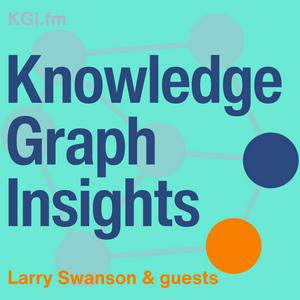Andrea Gioia: Human-Centered Modeling for Data Products – Episode 30
Andrea Gioia
In recent years, data products have emerged as a solution to the enterprise problem of siloed data and knowledge.
Andrea Gioia helps his clients build composable, reusable data products so they can capitalize on the value in their data assets.
Built around collaboratively developed ontologies, these data products evolve into something that might also be called a knowledge product.
We talked about:
his work as CTO at Quantyca, a data and metadata management consultancy
his description of data products and their lifecycle
how the lack of reusability in most data products inspired his current approach to modular, composable data products - and brought him into the world of ontology
how focusing on specific data assets facilitates the creation of reusable data products
his take on the role of data as a valuable enterprise asset
how he accounts for technical metadata and conceptual metadata in his modeling work
his preference for a federated model in the development of enterprise ontologies
the evolution of his data architecture thinking from a central-governance model to a federated model
the importance of including the right variety business stakeholders in the design of the ontology for a knowledge product
his observation that semantic model is mostly about people, and working with them to come to agreements about how they each see their domain
Andrea's bio
Andrea Gioia is a Partner and CTO at Quantyca, a consulting company specializing in data management. He is also a co-founder of blindata.io, a SaaS platform focused on data governance and compliance. With over two decades of experience in the field, Andrea has led cross-functional teams in the successful execution of complex data projects across diverse market sectors, ranging from banking and utilities to retail and industry. In his current role as CTO at Quantyca, Andrea primarily focuses on advisory, helping clients define and execute their data strategy with a strong emphasis on organizational and change management issues.
Actively involved in the data community, Andrea is a regular speaker, writer, and author of 'Managing Data as a Product'. Currently, he is the main organizer of the Data Engineering Italian Meetup and leads the Open Data Mesh Initiative. Within this initiative, Andrea has published the data product descriptor open specification and is guiding the development of the open-source ODM Platform to support the automation of the data product lifecycle.
Andrea is an active member of DAMA and, since 2023, has been part of the scientific committee of the DAMA Italian Chapter.
Connect with Andrea online
LinkedIn (#TheDataJoy)
Github
Video
Here’s the video version of our conversation:
https://www.youtube.com/watch?v=g34K_kJGZMc
Podcast intro transcript
This is the Knowledge Graph Insights podcast, episode number 30. In the world of enterprise architectures, data products are emerging as a solution to the problem of siloed data and knowledge. As a data and metadata management consultant, Andrea Gioia helps his clients realize the value in their data assets by assembling them into composable, reusable data products. Built around collaboratively developed ontologies, these data products evolve into something that might also be called a knowledge product.
Interview transcript
Larry:
Hi, everyone. Welcome to episode number 30 of the Knowledge Graph Insights podcast. I'm really happy today to welcome to the show Andrea Gioia. Andrea's, he does a lot of stuff. He's a busy guy. He's a partner and the chief technical officer at Quantyca, a consulting firm that works on data and metadata management. He's the founder of Blindata, a SaaS product that goes with his consultancy. I let him talk a little bit more about that. He's the author of the book Managing Data as a Product, and he's also, he comes out of the data heritage but he's now one of these knowledge people like us.
